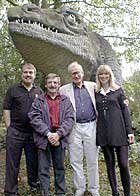

[ Sydenham team ]
![]()
Sydenham team
 |
The Sydenham team, left to right: Keith Wyncoll, Ian Bevan, Brian Dann and Sue Nagle pose by one of the Crystal Palace 'antedeluvian creatures' |
Sue Nagle, Ian Bevan, Keith Wyncoll and Brian Dann try to find out why the Crystal Palace ended up in Sydenham.
CRYSTAL PALACE GROUNDS
Ian and Sue walk around trying to find anything that may be left
from the Crystal Palace, finding columns, a subway entrance to a vanished railway station, a sphinx, balustrades, the base
of one of the towers.
CHATSWORTH HOUSE
Brian and Keith examine Joseph Paxton's letters. They discover that he tried very hard to keep the
Crystal Palace in Hyde Park after the Great Exhibition closed.
VICTORIA & ALBERT
In the National Art Library, Ian looks at documentations containing
arguments for and against the move to Sydenham, including a feasibility
study, a leaflet written by Paxton, four pamphlets against reconstruction
and articles in The Builder.
CRYSTAL PALACE MUSEUM
Sue examines various documents concerning the purchase of the
land and the reconstruction of the building.
CHATSWORTH HOUSE
Brian and Keith learn that Paxton rented Rockhills, a house in
Sydenham, to oversee the work of re-erecting the Crystal Palace
after an accident resulted in 12 deaths. Paxton himself became
less concerned with the project as he got older and took on his
responsibilities as MP for Coventry.
CRYSTAL PALACE MUSEUM
Sue and Ian study the records of the Crystal Palace Company and
the Crystal Palace Trustees, discovering that there were financial
troubles from the start as well as declining standards, which
led to the building falling into a poor state from the 1860s.
CRYSTAL PALACE GROUNDS
Ken Kiss, honorary curator of the Crystal Palace Museum, shows Sue the
graves of the 10 navvies who died during the building's reconstruction.
He then takes her to see the gatepost of Rockhills, the house
(now demolished) where Paxton lived to oversee the work after
the tragedy.
CRYSTAL PALACE MUSEUM
Brian, Keith and Sue delve further into the company records, finding
that there was a steady loss of income until the Crystal Palace
Company went into receivership in 1911. Ian looks at a video of
old films showing some of the various entertainments staged at the Crystal Palace, including the 1911 FA Cup (Newcastle
v. Bradford) and Brock's firework display of 1912.
